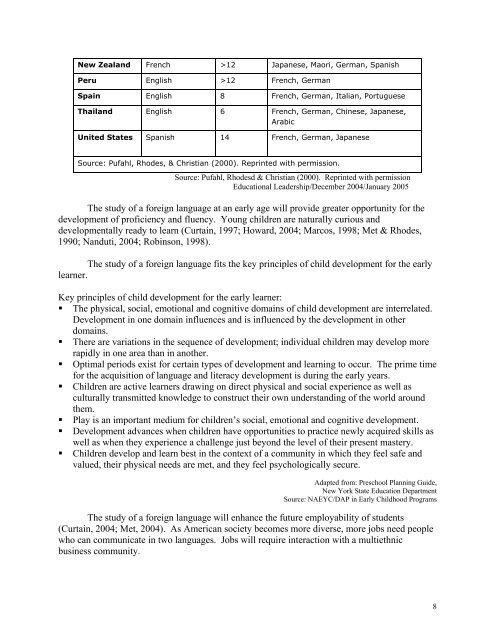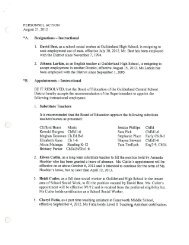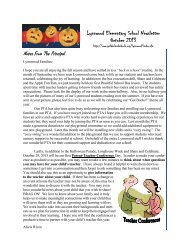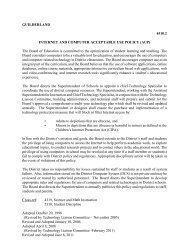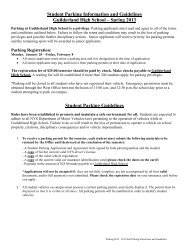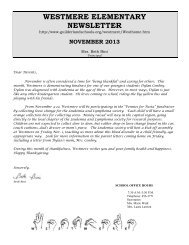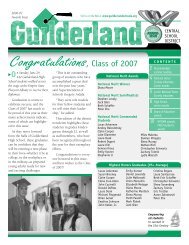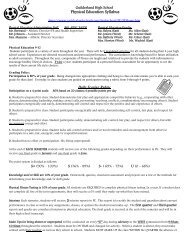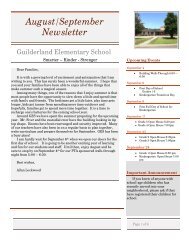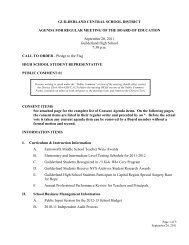How to Bring Our Schools Out of the 20th Century - Guilderland ...
How to Bring Our Schools Out of the 20th Century - Guilderland ...
How to Bring Our Schools Out of the 20th Century - Guilderland ...
You also want an ePaper? Increase the reach of your titles
YUMPU automatically turns print PDFs into web optimized ePapers that Google loves.
New Zealand French >12 Japanese, Maori, German, Spanish<br />
Peru English >12 French, German<br />
Spain English 8 French, German, Italian, Portuguese<br />
Thailand English 6 French, German, Chinese, Japanese,<br />
Arabic<br />
United States Spanish 14 French, German, Japanese<br />
Source: Pufahl, Rhodes, & Christian (2000). Reprinted with permission.<br />
Source: Pufahl, Rhodesd & Christian (2000). Reprinted with permission<br />
Educational Leadership/December 2004/January 2005<br />
The study <strong>of</strong> a foreign language at an early age will provide greater opportunity for <strong>the</strong><br />
development <strong>of</strong> pr<strong>of</strong>iciency and fluency. Young children are naturally curious and<br />
developmentally ready <strong>to</strong> learn (Curtain, 1997; <strong>How</strong>ard, 2004; Marcos, 1998; Met & Rhodes,<br />
1990; Nanduti, 2004; Robinson, 1998).<br />
The study <strong>of</strong> a foreign language fits <strong>the</strong> key principles <strong>of</strong> child development for <strong>the</strong> early<br />
learner.<br />
Key principles <strong>of</strong> child development for <strong>the</strong> early learner:<br />
• The physical, social, emotional and cognitive domains <strong>of</strong> child development are interrelated.<br />
Development in one domain influences and is influenced by <strong>the</strong> development in o<strong>the</strong>r<br />
domains.<br />
• There are variations in <strong>the</strong> sequence <strong>of</strong> development; individual children may develop more<br />
rapidly in one area than in ano<strong>the</strong>r.<br />
• Optimal periods exist for certain types <strong>of</strong> development and learning <strong>to</strong> occur. The prime time<br />
for <strong>the</strong> acquisition <strong>of</strong> language and literacy development is during <strong>the</strong> early years.<br />
• Children are active learners drawing on direct physical and social experience as well as<br />
culturally transmitted knowledge <strong>to</strong> construct <strong>the</strong>ir own understanding <strong>of</strong> <strong>the</strong> world around<br />
<strong>the</strong>m.<br />
• Play is an important medium for children’s social, emotional and cognitive development.<br />
• Development advances when children have opportunities <strong>to</strong> practice newly acquired skills as<br />
well as when <strong>the</strong>y experience a challenge just beyond <strong>the</strong> level <strong>of</strong> <strong>the</strong>ir present mastery.<br />
• Children develop and learn best in <strong>the</strong> context <strong>of</strong> a community in which <strong>the</strong>y feel safe and<br />
valued, <strong>the</strong>ir physical needs are met, and <strong>the</strong>y feel psychologically secure.<br />
Adapted from: Preschool Planning Guide,<br />
New York State Education Department<br />
Source: NAEYC/DAP in Early Childhood Programs<br />
The study <strong>of</strong> a foreign language will enhance <strong>the</strong> future employability <strong>of</strong> students<br />
(Curtain, 2004; Met, 2004). As American society becomes more diverse, more jobs need people<br />
who can communicate in two languages. Jobs will require interaction with a multiethnic<br />
business community.<br />
8


